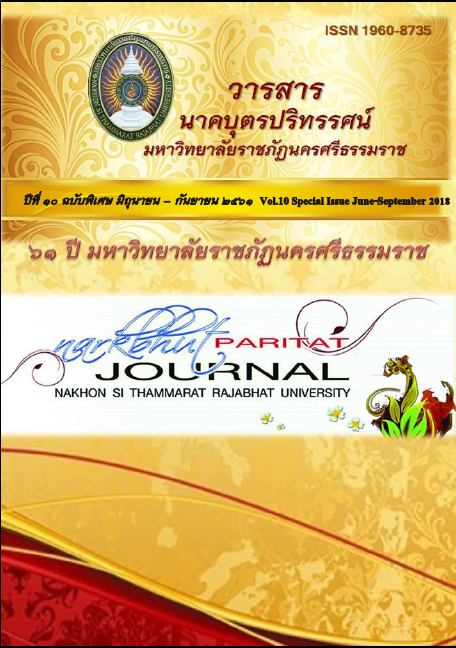การศึกษาคุณลักษณะอันพึงประสงค์ของบัณฑิต สาขาการจัดการวัฒนธรรมสร้างสรรค์ มหาวิทยาลัยราชภัฏนครศรีธรรมราช The Study of Desired Characteristics of Graduates from Creative Cultural Management Program, Nakhon Si Thammarat Rajabhat University
Main Article Content
บทคัดย่อ
การวิจัยเรื่อง การศึกษาคุณลักษณะอันพึงประสงค์ของบัณฑิต สาขาการจัดการวัฒนธรรมสร้างสรรค์ มหาวิทยาลัยราชภัฏนครศรีธรรมราช มีวัตถุประสงค์ในการวิจัยเพื่อ1) เพื่อศึกษาคุณลักษณะอันพึงประสงค์ด้านคุณธรรม จริยธรรม ด้านความรู้ ความสามารถทางวิชาการ ด้านทักษะทางปัญญาด้านทักษะความสัมพันธ์ระหว่างบุคคลและความรับผิดชอบ ด้านทักษะการวิเคราะห์เชิงตัวเลข การสื่อสารและการใช้เทคโนโลยี และด้านคุณลักษณะเด่นตามอัตลักษณ์2) เพื่อหาแนวทางการพัฒนาคุณลักษณะอันพึงประสงค์ในการผลิตบัณฑิตโดยใช้การวิจัยเชิงปริมาณและเชิงคุณภาพ เครื่องมือในการวิจัยใช้แบบสอบถาม และแนวคำถามสำหรับการสนทนากลุ่ม
ผลการวิจัยคุณลักษณะของบัณฑิตที่พึงประสงค์ สาขาการจัดการวัฒนธรรมสร้างสรรค์ มหาวิทยาลัยราชภัฏจังหวัดนครศรีธรรมราช ของผู้มีส่วนได้ส่วนเสีย 4 กลุ่ม คือ ผู้นำและผู้บริหาร องค์การท้องถิ่นเกี่ยวกับฝ่ายสนับสนุนองค์กรหน่วยงานเอกชน และบุคคล กลุ่มคนที่มีบทบาทการเป็นผู้นำจัดกิจกรรมวัฒนธรรมทั้ง 6 ด้าน มีความคิดเห็นด้านอัตลักษณ์บัณฑิตในภาพรวมค่าเฉลี่ยแต่ละระดับมาก สำหรับประเด็นที่มีค่าเฉลี่ยด้านความรู้สูงสุด คือ 4.47 และส่วนเบี่ยงเบนมาตรฐาน.60 สำหรับค่าเฉลี่ยด้านทักษะการวิเคราะห์เชิงตัวเลข การสื่อสาร และการใช้เทคโนโลยีสารสนเทศต่ำสุด คือ 4.22 และส่วนเบี่ยงเบนมาตรฐาน.65
ผลจากการสนทนากลุ่มผู้ใช้มีส่วนได้ส่วนเสีย พบว่า ในกลุ่มนักพัฒนาเกี่ยวกับการอนุรักษ์ ทำนุบำรุงพระพุทธศาสนา พิธีกรรม และประเพณีประจำท้องถิ่น ในกิจกรรมที่ดำเนินการนักวัฒนธรรมควรมีบทบาท หน้าที่ ร่วมในกิจกรรมที่สำคัญ ในการร่วมวางแผนโครงการ การจัดการองค์ความรู้ เนื้อหา และประสานชุมชน ประสานคน การประชาสัมพันธ์อย่างไรก็ตามบัณฑิตทางด้านวัฒนธรรม ที่จะเป็นนักวัฒนธรรม เป็นผู้ดำเนินการนำองค์กรไปสู่การปฏิบัติการด้านวัฒนธรรมท้องถิ่น ควรมีความรู้ทางด้านการจัดการ การเป็นผู้นำในเรื่องวัฒนธรรม ประสานงานอย่างมีส่วนร่วมกับชุมชน หน่วยงานภายนอกและภายในองค์กร ร่วมไปถึงการรวบรวมจัดการข้อมูลภูมิปัญญา วัฒนธรรมประเพณีท้องถิ่น ควรเป็นนักพัฒนาวัฒนธรรมแนวใหม่ให้มีความทันยุคทันสมัย ในเรื่องฐานข้อมูล การเผยแพร่ข้อมูล การสร้างแหล่งเรียนรู้ที่เข้าถึงข้อมูลได้สะดวกรวดเร็ว สามารถพัฒนาวัฒนธรรมดั้งเดิมกับเทคโนโลยีที่มีความสอดคล้องไปด้วยกันได้
Article Details
เอกสารอ้างอิง
กรณีศึกษา บัณฑิตสาขาวิชาภาษาอังกฤษเพื่อการสื่อสารคณะสังคมศาสตร์และศิลปศาสตร์ มหาวิทยาลัยนอร์ท เชียงใหม่.เชียงใหม่: กองทุนวิจัยมหาวิทยาลัยนอร์ท– เชียงใหม่.
ฉวีวรรณ แจ้งกิจ และคณะ (2554). ศึกษาคุณลักษณะของบัณฑิตที่พึงประสงค์ตามกรอบมาตรฐาน
คุณวุฒิการศึกษาระดับอุดมศึกษาแห่งชาติสาขาวิชาอุตสาหกรรมการบริการอาหาร คณะเทคโนโลยีคหกรรมศาสตร์. กรุงเทพฯ: มหาวิทยาลัยเทคโนโลยีมหานคร.
ชัยธวัช อุตเสน. (2551). การเปรียบเทียบผลการใหคําปรึกษาแบบกลุมที่มีตอความรับผิดชอบ
ทางการเรียนของนักเรียนชวงชั้นที่ 3 ระหวางทฤษฎียึดบุคคลเปนศูนย์กลางและทฤษฎีพฤติกรรมนิยม. (ปริญญาการศึกษามหาบัณฑิต สาขาวิชาจิตวิทยาการใหคําปรึกษา, มหาวิทยาลัยมหาสารคาม).
วิจารณ์ พานิช. (2552). กรอบมาตรฐานคุณวุฒิระดับอุดมศึกษาแห่งชาติ (TQF). {ออนไลน์}
สืบค้นเมื่อ 10 มีนาคม 2561 จาก https://www.academic.nu.ac.th.
อเนก กัลยนี. (2542).ความพึงพอใจของนักศึกษานอกโรงเรียนสายสามัญศึกษาระดับ
มัธยมศึกษาวิธิีเรียนทางไกลที่มีบทบาทตอครูประจํากลุม จังหวัดสกลนคร. (รายงานการคนควาอิสระการศึกษามหาบัณฑิต สาขาวิชาการบริหารการศึกษา, มหาวิทยาลัยมหาสารคาม).
Donald and Other. (2012). A comparison of the views of college of business graduate
and undergraduate students on qualities needed in the workplace. College Student Journal : Project Innovation (Alabama). 46(2).
English,D. E., Manton, E.J., Wallker, J.I. &Brodnax T.L. (2008). Human resource
managers’ and AACSB college of business deans’ perceptions of selected communication competencies. Journal of Global Business. 19(38), 25-34.
French, Wendell. (1964). The Personnel Management Process : Human Resource
Administration. Boston: Houghton.
Gordon Rugg and Marian Petre. (2007). A Gentle Guide To Research Methods.
New York: Mc Graw Hill
คณะกรรมการอุดมศึกษา, 2552.https://www.mua.go.th/users/tqf-hed/.สืบค้นวันที่ . 1 มีนาคม 2561.


